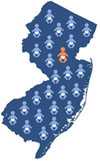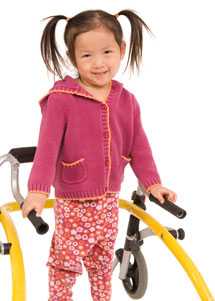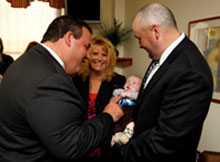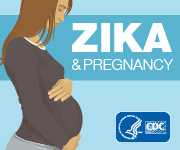Birth Defects Tracking in New Jersey
New Jersey Special Child Health Services Registry

1 in 25 babies born in New Jersey has a major birth defect
The New Jersey Special Child Health Services Registry is essential to understanding the impact of birth defects in the state. The registry tracks certain birth defects and their trends over time, links children and families to important local resources, and works with community partners to spread the message about birth defects prevention.
Common. Costly. Critical.
- Each day, 20 babies in New Jersey are born with a birth defect and linked to important local services. With over 100,000 births per year, the registry monitors and links more than 8,000 babies a year to needed services for birth defects and other special needs conditions.
- Birth defects are costly – hospital costs for the treatment of birth defects are more than $2.5 billion each year in the United States.
- Babies born with a birth defect are more likely to die before their first birthday, compared to babies born without a birth defect.

About the Program
Founded in 1926, the New Jersey Special Child Health Services Registry (SCHS Registry) has been serving children and families for over 75 years. The registry collects information on all babies born with a birth defect or other special needs in New Jersey, which is important for understanding the impact of these conditions in the state. The registry monitors more than 100,000 babies born annually, and is one of 14 birth defects programs that receive a grant funded by CDC’s National Center on Birth Defects and Developmental Disabilities.
The SCHS Registry works to:
- Collect and analyze information on children up to age five born with a birth defect to look for patterns and trends over time
- Link children to important case management units to facilitate coordination of needed health, education, financial, and social services
- Respond to community concerns about potential clusters (meaning more babies are born with a certain birth defect in a certain area or over a certain time period than would be expected)
- Provide information so that policymakers can make informed decisions
- Educate the community, healthcare providers, and service agencies about birth defects
Program in Action
- Links New Jersey families to important community resources: By linking registered children with their local special child health county case management units and early intervention programs, children and their families are able to obtain the needed resources and information that they need. For some families, this means getting information about parent groups or help with completing financial assistance forms.For other families, they are able to get help acquiring medical equipment such as hearing aids or feeding pumps, so that they can care for their children at home.
- Responded to Super Storm Sandy: The registry helped support children and youth with special healthcare needs who were affected by Super Storm Sandy. The registry helped link these families to needed resources and monitored the success of this support. The registry will evaluate these efforts to learn more about supporting families affected by emergency situations.
-

Governor Chris Christie pictured with the first baby in the state identified by newborn screening for critical congenital heart defects.
- Monitors screening for critical congenital heart defects: New Jersey was one of the first states to enact legislation requiring all newborns to be screened for these serious heart defects. Newborn screening for critical congenital heart defects can identify some infants with these conditions before they get sick or show signs of problems. Once identified, babies with a critical congenital heart defect can receive specialized care and treatment that may prevent disability or early death.
-
Promotes birth defects prevention: Working with community partners, the registry has formed the “Partners in Prevention” group. Partners have joined together to discuss new and innovative ways to reduce birth defects. To date, the group has:
- Translated preconception health materials into the top five foreign languages spoken in New Jersey: Arabic, Hindi, Korean, Polish, and Spanish
- Created a video for teens about preventing birth defects. This video includes teens who have siblings with a birth defect sharing their own perspective
- Convened a workshop to create strategies for primary care providers to better educate women of childbearing age.
Making a Difference
The program links families with special healthcare needs to local services. The impact of these activities is shown in the example below:
Ming was registered with the New Jersey program and referred to her local case management unit. Although she had complex medical needs, Ming’s mother wanted to care for her at home in her family’s Asian culture manner. Ming’s case manager worked with Ming’s mother, rehab center staff, and the NJ Medicaid Waiver office to ensure adequate coverage to address Ming’s complex health care. Ming was allowed to go home to her family with private nursing, durable medical equipment, and therapies. Her mother cried tears of joy to have Ming home. She is thankful to have someone advocating for Ming, and “…knows there is someone she can call at any time and receive a response.”
More Information
For more information on the New Jersey Special Child Health Services Registry, please visit their website.
- Page last reviewed: May 16, 2016
- Page last updated: September 21, 2016
- Content source:



 ShareCompartir
ShareCompartir